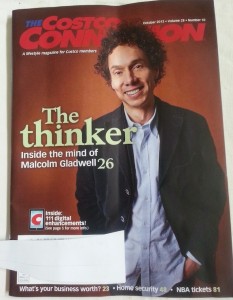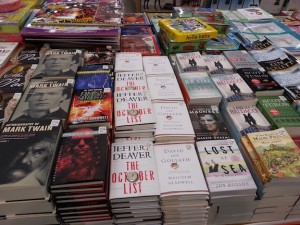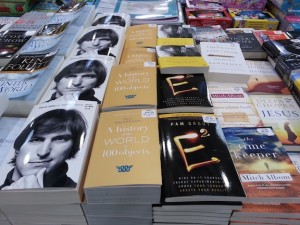My October 2013 Costco Connection came in the mail yesterday. This is normally not a noteworthy event, but the cover story caught my eye: “The Thinker: Inside the Mind of Malcolm Gladwell.”
The profile of Gladwell is running this month to highlight the fact that his newest book, David and Goliath, is available for sale in Costco warehouses.
In light of both recent and long-running conversations on this blog — conversations about the idea of the public intellectual, the reach (or lack thereof) of academic writing, the phenomenon of anti-intellectualism, the disciplinary differences arising from various hierarchies of sources and qualitative judgments about what should count as ideas or thought — I found Gladwell’s characterization of his own role as a writer interesting:
“I feel that people are experience-rich and theory-poor. That is to say, most people have lots and lots and lots of experiences but don’t have the time to try to make sense of them. It’s a luxury to be able to sit and theorize and read psychologists, sociologists and historians and to attach explanations to events. The reason people read books like my own is that they’re searching for those kinds of explanations, of ways of making sense of things. There is this tremendous body of knowledge in the world of academia where extraordinary numbers of incredibly thoughtful people have taken the time to examine on a really profound level the way we live our lives and who we are and where we’ve been. That brilliant learning sometimes gets trapped in academia and never sees the light of day. I’m trying to give people access to all of that brilliant thinking. It’s a way of going back to college long after you’ve graduated.”
This is, it seems to me, a pretty good summary of what a “popularizer” does. Whether or not Gladwell is a good popularizer is a matter of dispute. Most academics I know seem to hold him in contempt. Like listening to NPR, a disdainful sneer at the mention of Malcolm Gladwell’s name seems to be one of the status signaling gestures of a True Intellectual — or, at least, a True Academic. I believe the party line here would be to say, “All that brilliant thinking never sees the light of day in Gladwell’s work either,” or something like that. So get that out of your system in the comments if you must.
But I’m more interested in how this statement of Gladwell’s functions as part of a marketing campaign. The target audience — for Gladwell, for Costco — emerges very clearly: a comfortably middle-class to affluent audience of college-educated professionals who would like to continue their education informally, or at least expand their intellectual horizons. Again, whether those buyers are getting what they pay for in Gladwell’s books is almost beside the point. What’s intriguing is the idea that “access to all of that brilliant thinking” might be what consumers want.
Perhaps, though, the big selling point here is that Gladwell is “the thinker.” The marketing campaign promises that Gladwell has done the hard work of translating these ideas and insights into an accessible, readable narrative. But the interview (which you can read in its entirety here) is very careful to suggest that Gladwell hasn’t done all the work — his books are portrayed as gently provocative and occasionally controversial. The article finessed this last point very smartly: “Several authors and columnists have challenged assertions or claims in his books, but that at least proves he knows how to stimulate debate among his readers.” That is some savvy PR writing.
Gladwell is a savvy writer too, and he knows his audience. The fact that he is able to achieve bestseller status with titles marketed as “big idea books” might be taken by many critics as a sign of Americans’ shallow thinking, intellectual laziness, etc.
But I tend to see such phenomena more hopefully. I tend to think that Gladwell is right about why many people read his books: because they want to think about stuff they haven’t thought about before, they want to consider things in a new light, but they don’t quite know how to go about it, and these books promise to help them do that.
I think it’s unseemly and terribly unkind to hold such aspirations in contempt. It’s also counterproductive. If we want to see that different ideas, or better ideas, or more important ideas, or more important thinkers, gain a hearing in the public square, I think we have to start with where people are and who people are, what they want, and what they value. And I don’t think that Malcolm Gladwell’s books are a bad place to start. I have enjoyed reading them and discussing them with friends who aren’t academics. I have never discussed them with friends who are academics — until now.




11 Thoughts on this Post
S-USIH Comment Policy
We ask that those who participate in the discussions generated in the Comments section do so with the same decorum as they would in any other academic setting or context. Since the USIH bloggers write under our real names, we would prefer that our commenters also identify themselves by their real name. As our primary goal is to stimulate and engage in fruitful and productive discussion, ad hominem attacks (personal or professional), unnecessary insults, and/or mean-spiritedness have no place in the USIH Blog’s Comments section. Therefore, we reserve the right to remove any comments that contain any of the above and/or are not intended to further the discussion of the topic of the post. We welcome suggestions for corrections to any of our posts. As the official blog of the Society of US Intellectual History, we hope to foster a diverse community of scholars and readers who engage with one another in discussions of US intellectual history, broadly understood.
Fantastic and thoughtful post as always. I’ve not read enough of Gladwell to pass judgment on him, but I can say most of my interactions with his work are actually through Bill Simmons, espn.com writer and editor of grantland.com. It’s interesting to read and listen to their conversations that touch on culture, politics, and of course, sports, because they’re big, sprawling conversations that build off of very interesting ideas.
As for Gladwell: can we refer to him as a public intellectual? I think he might qualify, but he’s also indicative of a long tradition of people wanting access to more information. I wonder if folks who read Gladwell decide to read the work that he’s basing his info off of. It wouldn’t surprise me if they were. The blog of Ta-Nehisi Coates on theatlantic.com has a vibrant reader base which is often as interested in his footnotes and citations as they are in his actual arguments (which are always well-written and clearly debated).
As you may know, Robert, I’m probably the wrong person to ask who is and isn’t a public intellectual. However, since Gladwell makes a living writing about and discussing ideas for a public audience, I don’t see why he wouldn’t count as a public intellectual — as would Ta-Nehesi Coates.
For the gatekeepers who worry that public intellectuals aren’t what they used to be, and who are zealous over guarding the exclusivity of the term “intellectual,” all I can suggest is that they might do better to worry about nailing down or shoring up the “public” part of that job description.
The “public”, in this internet age, is so hard to pin down. After all, it seems that the media as a whole seems so….what’s that word…”fractured”?
All (terribly bad) joking aside, I do think about our era of public intellectuals. Considering I just started reading “The Last Intellectuals” today, I’m thinking very hard about what is and isn’t a public intellectual. Besides, both parts of that phrase need to be interrogated. I think the more pertinent question, when it comes to people like Gladwell, is what’s the future of the idea of public intellectuals? Because I think they’ll always be an audience for “big ideas”.
Indeed, I am working on a section of my dissertation that deals with one aspect of that fractured public of some significance (I think) to the canon debate. We’ll see if the argument can bear weight and still hold shape. The whole question of “whither the public intellectual” seems to me better phrased as “whither the public.” The means — the media — by which that public was called forth/called into being as an audience (as opposed to many disparate audiences) are going, going, gone. New media will call forth a new “shape” of public — not yet clear what that will be. But the “public intellectual” of the age of consensus has gone the way of the newspaper and the nightly news. Or so it seems to me.
My October 2013 Costco Connection came in the mail yesterday. This is normally not a noteworthy event, but the cover story caught my eye: “The Thinker: Inside the Mind of Malcolm Gladwell.”
Oh no. It took Costco for USIH to find a lingua franca.
The Gladwell story was OK. The Swiffer WetJet Starter Kit for only $18.99 on p. 16, now that’s something we can all get behind.
Intellection is participation in the divine mind, but it’s cleanliness that’s closest to godliness. The $3.00 beef jerky coupon looks pretty good too. No bones!
In terms of Gladwell as a thinker/intellectual, I learned from some UT Dallas undergrads that one of his books (*Outliers,* I believe) was assigned reading in high school, in the International Baccalaureate capstone class they took during their senior year.
They also read Lysistrata, Heart of Darkness, Hamlet, Pride and Prejudice, The Sound and the Fury, The Power and the Glory, as well as The Story of Philosophy and selections from Western philosophy. How Gladwell fit into all that I’m not sure, though my guess would be that it had something to do with thinking about how “success” may depend on much that is not your own doing.
Fascinating, like always. Talking about the shaping of a midbrow liberal public in a more conventional sense, Gladwell was the featured writer in the “By the Book” interview of this week’s Sunday Book Review in the NYT. If there’s a section I like to read in the SBR, aside from the letters, it’s this one: it tells us a lot about how writers perceive themselves and how they construct their intended audience.
I haven’t read Gladwell, but he is up there among journalists–he writes mostly for the New Yorker–who translate current academic research into a more “accessible” language, more accessible narratives. Indeed, one could see him as a translator, thinking that translations are always a new creation, always different from the original. I have a friend who works for a lefty union and she admires his book on leadership, The Tipping Point, because it offers helpful tips for organizing workers in an “easy to understand” language. I am not sure Gladwell saw his book influencing union organizing, but this says something about the wide reach of his work.
LD–A very interesting piece. While I have heard of Malcolm Gladwell, I must confess that I did not know much about him. Gladwell reminds me of someone like Walter Isaacson who is not an academic, but nonetheless writes popular biographies of Ben Franklin and Steve Jobs.
Your piece also makes me think of the TED talks. While people thirst for knowledge and ideas, they often do not want to get deep into the academic weeds like many academics.
Kahlil, that bit about the Gladwell book as an aid to union organizing is an interesting example of how ideas move across boundaries of politics, disciplines, ‘brows, etc.
Jason, I think Gladwell does give TED talks. He has also been a guest on The Daily Show and the Colbert Report a few times, I think. That’s where I first heard of him a few years back. (So now I’ve outed myself as someone who is not a regular reader of The New Yorker — at this rate, I’ll never get a job in academe.)
Great post. One thing, however, that I think it misses about Gladwell is that I’ve always seen his target market as not only “a comfortably middle-class to affluent audience of college-educated professionals who would like to continue their education informally,” but also the CEO or wannabe CEO-set. In other words the same type of “business leader” who reads _Moneyball_ or _The Art of War_.
This market is looking for something different than the target market you describe. These guys (and they are overwhelmingly male) want some sort of secret to business success that is “outside the box.” I can speak from personal experience on this as the only person that has ever talked up Gladwell to me is a person I know who identifies in such a way. He talked about reading _Outliers_ in advance of a gathering for businessmen where Gladwell was invited to speak.
This crowd, I would submit, is the real moneymaker for Gladwell as it leads to huge speaking fees at corporate gatherings.
There’s no doubt that the business exec/entrepreneur must be a huge part of Gladwell’s audience. And there’s some significant overlap between that demographic and Costco’s market share.
But I can speak from personal experience about the demographic I mentioned above — my non-academic, professional friends who read Gladwell because he invites them to think about things they may not have considered before, or to think about familiar things in a different way. I would expect that this audience is sizable as well, and no doubt influences the other audience. Everybody wants to read the book that everybody is talking about, so the more market segments a book appeals to, the better sales should be.